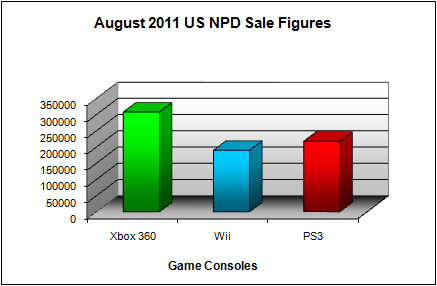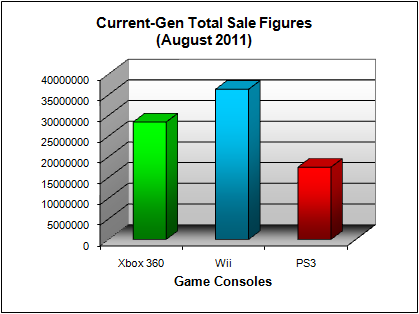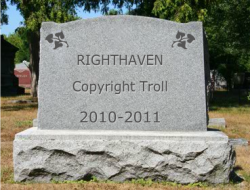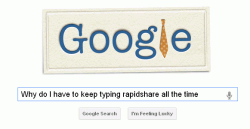Welcome to yet another edition of the WNR. Hope you’ve had a good week. It was mainly an uneventful week for me, except my graphics card broke early on the in the week, and so I had found the perfect excuse to do a little bit of upgrading. Faced with restrictions in budget, card length (my old Antec Sonata Designer case would only fit a card 23cm/9″ or less), power supply constraints (although my Antec EarthWatt 500W, with dual 17A rails on the 12V, is not the worst around), I eventually settled for a Radeon 6850, upgrading exactly +2,000 from my old Radeon 4850. While my Intel E8500 is now the bottleneck in certain games, it’s definitely great to be able to play most games at 1080p without having to turn down the details (or as in my old card’s case, all the way down to 1360×768 @ medium just so it doesn’t crash the faulty card). A quick, cheap, and not so nasty upgrade is sometimes a great way to give some life back to an old PC.
More than expected number of news items this week, so let’s get started.

In copyright news, it’s hard to know where to begin. I guess we should start with the source of the problem, the money. More precisely, the money flowing into Washington and other capitals of the world, as the copyright lobby spends millions scaring politicians into believing “net piracy plague” hype.
It was revealed this week that the MPAA spent $470,000 in lobbying in the last quarter alone, mainly to promote the hugely controversial PROTECT IP act, which if you’ve been following the WNR, you should already know that it has come under attack by a variety of professionals, from engineers, to entrepreneurs, to law professors. The idea of messing around with the foundation of the Internet, the domain naming system, just so the billion dollar movie industry can feel a little bit better, without actually solving any real problems, is I guess what these professionals are most concerned about. Basically, the MPAA has convinced politicians that the few harmless flies are actually killer bees, and that the only way to solve the problem is to launch a tactical nuclear strike (except in this analogy, the nuclear strike would probably solve the fly problem, whereas PROTECT IP won’t do anything to piracy).
What surprised me more was that, despite being only a fraction of the size of the movie industry, the music industry via its lobby group the RIAA actually spend almost three times as much money – $1.25M, in just one quarter. And somehow, this was still down on last year’s $1.4M, in the same quarter. Had the RIAA simply spend the money they’ve spent on lobbying and DRM, on actual innovation, they would have been the ones making the iPod and running iTunes, not Apple. Instead, they spend a million plus trying to get new legislation through that would allow labels to receive royalty from radio station airings – once upon a time, labels were happy to just get free airings for promotional purposes, but not any more I guess.

RapidShare will hope its recent lobbying spending of $260,000 is enough to convince Washington politicians not to kill off the file sharing industry
The same story also showed some lobbying from the other side, specifically, by Rapidshare. If PROTECT IP passes, they have the most to lose, since they will probably be the first website to get filtered, after having appeared in all the copyright blacklists. There would be far too much collateral damage if lawmakers outlaw public file sharing, because while I do admit Rapidshare has its fair share of pirated files, it’s also an essential service for many others to share large files without having access to your own FTP server. I can’t see how you can have a public file sharing service without the problem of piracy cropping up, but it’s not as if Rapidshare doesn’t have tools for rights holders to get infringing files removed – it’s just that rights holders don’t want to have to do the work to get them removed. Automatic filters are easy to escape by real pirates, but makes false positives hard to avoid – think of the YouTube false positive copyright thing and times it by about 1,000, since at least with YouTube, some kind of audio/visual analysis could be performed, while it’s harder with generic files.
The world’s second most famous music pirate, Boston University student Joel Tenenbaum, is back in the news this week as the RIAA’s appeal of an earlier reduction in damages, to “only” $67,500, was rejected by the appellate court. But not because they supported the original jury rewarded $675,000, but because they thought that Judge Nancy Gertner has jumped to the constitutional issues a bit too early in citing the reason for the reduction, when there were other legal recourse that should have been taken before going down this route. It appears that the appeals court agrees that $675,000 was inappropriate, and in their summary, even urged Congress to consider reducing the excessive statutory damages in relation to copyright infringement (but we’ll be lucky if Congress doesn’t do the opposite, and increase statutory damages). This is become a bigger issue, because back in the day, most copyright infringement lawsuits were related to commercial infringement, and so the statutory damages are relevant to those types of cases. Today, most copyright infringement cases relate to non commercial infringement, such as illegally downloading a 99 cent song for free, and so $150,000 per act of infringement doesn’t really fit the “crime” any more. A sensible copyright reform would introduce a new tier of penalties dealing specifically with non commercial infringement, because a fine of $150 per act is enough of a deterrent for those that actually fear the law on the matter (most don’t, even with $675,000 in damages as a potential outcome). And so for now, Tenenbaum faces $675,000 in damages again, which will of course be appealed.
But Boston University students aren’t the only ones having money trouble these days. Righthaven’s refusal to pay the $34,000 in legal fees it owns to Wayne Hoehn, possibly through lack of ability to pay, has forced Hoehn’s attorneys to petition the court to send US Marshals to seize Righthaven assets in response. Now that would be a beautiful sight to behold, wouldn’t it? Righthaven took the risk in trying to scare Hoehn into paying a settlement fee, only for Hoehn to refuse to lie down and fight his way to a win in court, and so it’s only fair that Righthaven should pay up. After all, they’re the ones who send letters threatening tens and hundreds of thousands in damages, if people don’t settle. They should have taken their own advice and settled, if they didn’t want to pay up (except I think the judge refused them the right to do so, heh).
Over to Europe right now, whose financial system should collapse any day now, but before then, there are some deck chair shuffling that needs to happen. In Italy, MPs from Berlusconi’s party (why is the guy still prime minster?) want to introduce the world’s first “one-strike” system, where people may get kicked off the Internet for just a single allegation of copyright infringement. Sometimes I think politicians are actually just using copyright as an excuse to kill off the Internet, as the Internet is making it harder to rule against the wishes of the people. And also to hide your bunga bunga parties. You know what this is? It’s fascism. And we all know how Italians deal with fascists (well, eventually, anyway).

The SFI's IP address being used for piracy should not be proof that the institute was engaged in piracy
On to Sweden, and the Swedish Film Institute has just gone through what hundreds and thousands of individuals have gone through, after the SFI was accused of pirating films because its IP address had been found in one of many BitTorrent swarms. It would be hard for the SFI to go with the “my router was hacked” excuse, because no hacking did occur, but because they operated a public Wi-Fi, and because the agency tasked with collection IP addresses aren’t cooperating with the SFI on the investigation, it has been extremely difficult for the SFI to find the source of the piracy. And if this doesn’t prove that an IP address does not equal the identity of the individual(s) who made the infringement, then nothing will. And if public Wi-Fi is now going to be the target of anti-piracy operations, then that’s taking a huge step backwards in terms of the Internet everywhere approach that we’ve become used to (and which many websites, like Facebook or FourSquare, rely on).
And this increasing perception gap between how the world works now, and how the copyright lobby/politicians want things to work, is probably why the German Pirate Party has won 15 seats in the Berlin regional elections. With their Swedish counterpart winning a seat in the EU parliament, pirate parties around the world could become the new Greens, as the issue of Internet privacy and rights become more and more important.

In HD/3D news, next week should bring us the Star Wars numbers, an early signs show that it will be a big one. I’m a huge Star Wars nerd, having watched the originally trilogies at least 50 times altogether (and the new prequels trilogies about 6 times), but I’ve actually not pre-ordered the set. It’s not a protest at George Lucas or anything, but while Star Wars on DVD was a special moment for me, I’m a bit more meh about Star Wars on Blu-ray for some reason. Probably because, upscaled, the DVD edition still looks quite good, and from early reviews, while the Blu-ray version definitely looks better, the classic trilogies aren’t the “hi-defy” experience that many would be expecting. It’s not only the age of the film that the cause, but I think not going with a new transfer, given advances in technology since the last one, seems like a step backwards. Which is why I suspect we’ll get a new transfer in time for next year’s 3D version of the films, which means a new Blu-ray set (hopefully with the remastered films in 2D, as well as 3D), and so it’s hard to get too excited. I will still probably get it, I mean I got the LotR theatrical mess on Blu-ray.
Plus, I’m finding it difficult to get the time to watch movies these days, got a dozen or more on Blu-ray that’s still under shrink wrap.
For 3D news, this week, YouTube announced a new feature in which you can convert any existing or new uploaded 2D video to 3D. Cool if you like this sort of thing, but the 3D hype is definitely dying, and the 2D to 3D conversion could be the jump the shark moment for the format, because really, it’s an admission by YouTube that nobody is uploading any real 3D content.
![]() And finally in gaming, those that saw and agreed to the new PSN user agreement, without reading it (obviously didn’t watch that South Park episode), may realise that they’ve signed over more than they realised.
And finally in gaming, those that saw and agreed to the new PSN user agreement, without reading it (obviously didn’t watch that South Park episode), may realise that they’ve signed over more than they realised.
Sony apparently sneaked a clause which makes it a lot harder for people to join in one of the many class action lawsuit against Sony for the PSN data theft. Those that signed the agreement will have agreed to go through binding individual arbitration before being allowed to join any class action lawsuit, with a Sony appointed arbitrator. If you don’t sign the agreement, then you won’t be allowed to use PSN, but you can opt out of the arbitration only by sending a letter to Sony HQ detailing your wishes, and within 30 days of signing the original agreement, and of course, all of these details were “hidden” in the wordy user agreement. I’m not going to comment on whether this is an underhanded move by Sony or not, but all I will say is that this is exactly what you would expect from such a company, and probably why it’s such an attractive target for hackers.

Diablo III could be a great game, but Blizzard are doing all they can to ruin it with "always-on" DRM and MMO restrictions, without any of the MMO benefits, in the single player mode
Diablo III is an eagerly awaited game, and Blizzard has a great reputation as a game producer. But the company’s insistence on using always-on DRM, they say for anti-cheating purposes, not anti-piracy, could really hurt their reputation, not to mention sales of the game. A recent play of the beta version seems to show a lot of quirks related to the always-on DRM, including the inability to pause games, and game glitches whenever the connection goes down (and it went down a lot, thanks to the flaky beta Blizzard servers), and eventually users get thrown back to the main menu, losing unsaved progress. Hopefully, the final version will not be as “crippled”, but without adding in a true offline mode, Blizzard is always going to set themselves up to fail. The good news is that there’s still a lot of time between now and the game’s release, so enough public pressure could make Blizzard do the right thing.
And that’s all that was for the week. I’m off to play Starcraft 2 in 1080p, extreme quality mode (which is more than playable at 50/60 FPS on my new 6850, at least when the on screen unit count isn’t too high). See you next week.










